
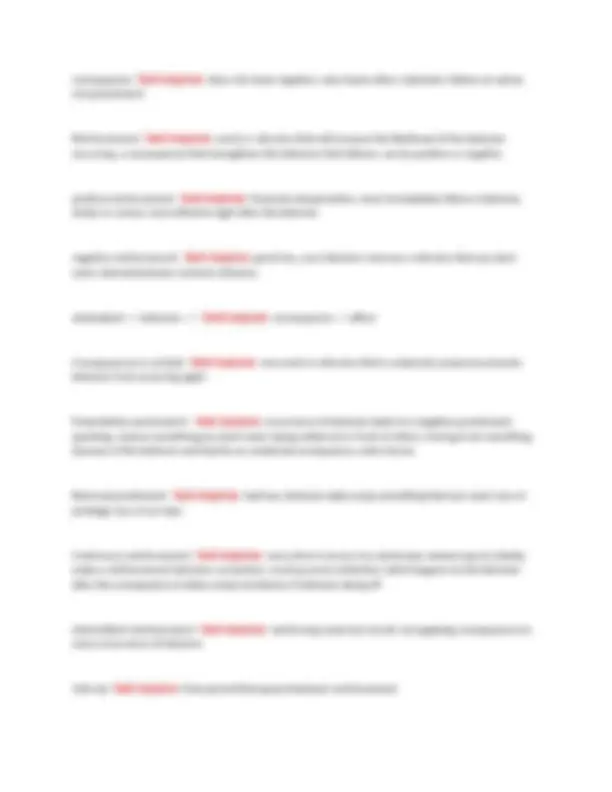
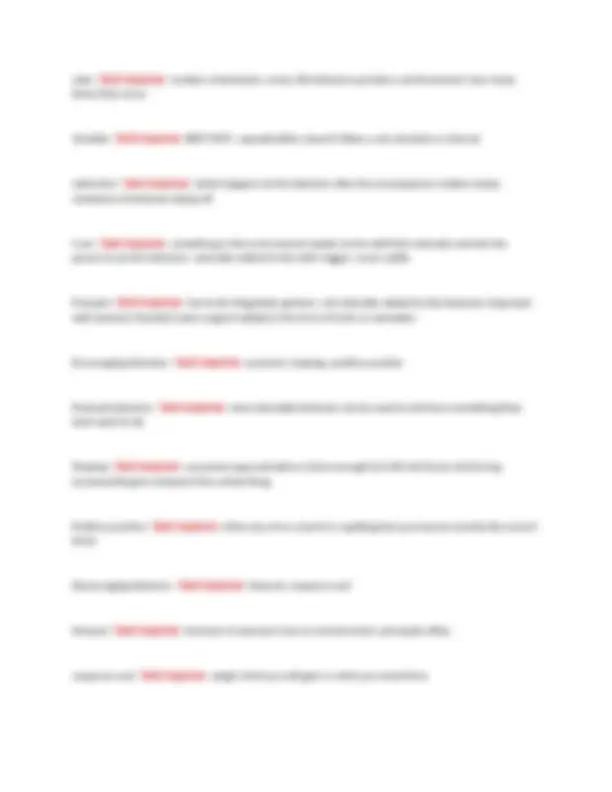
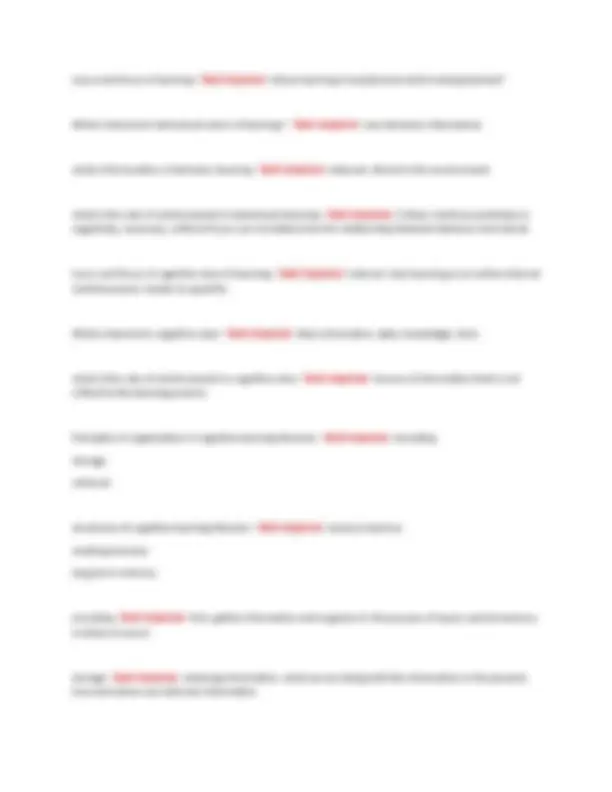
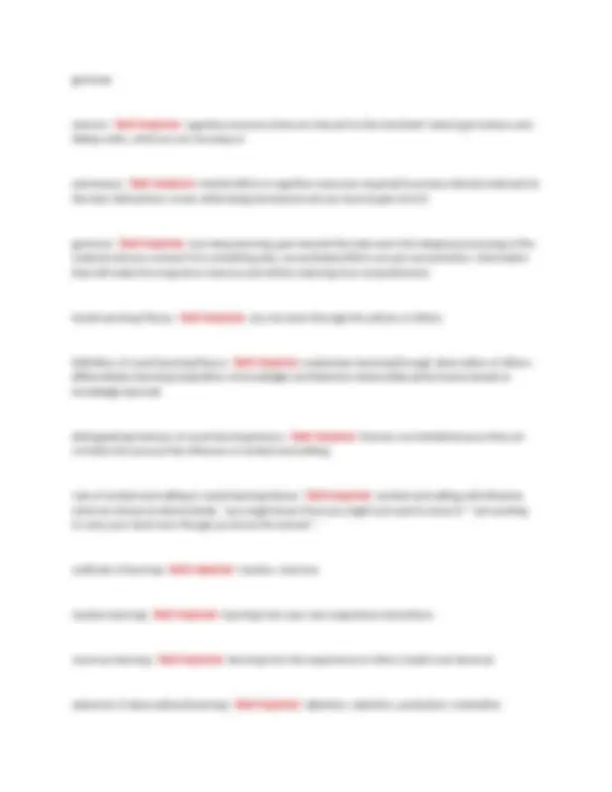
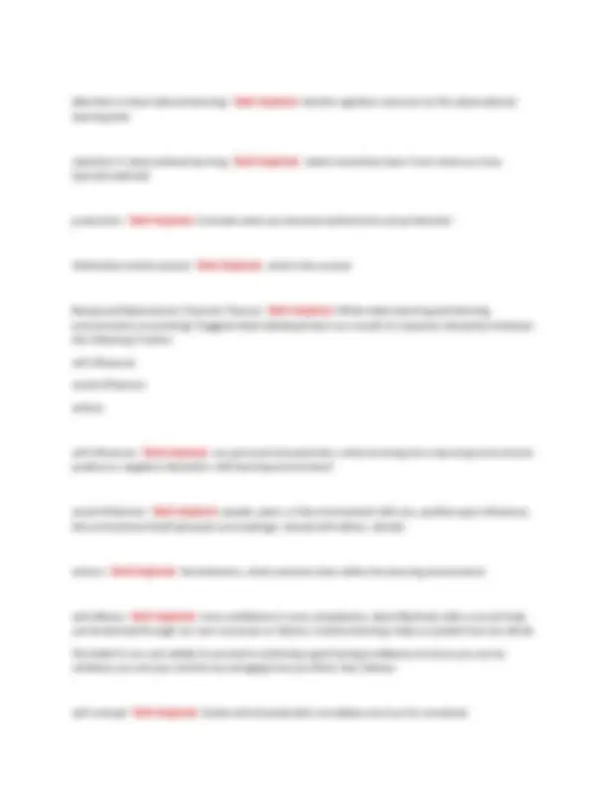
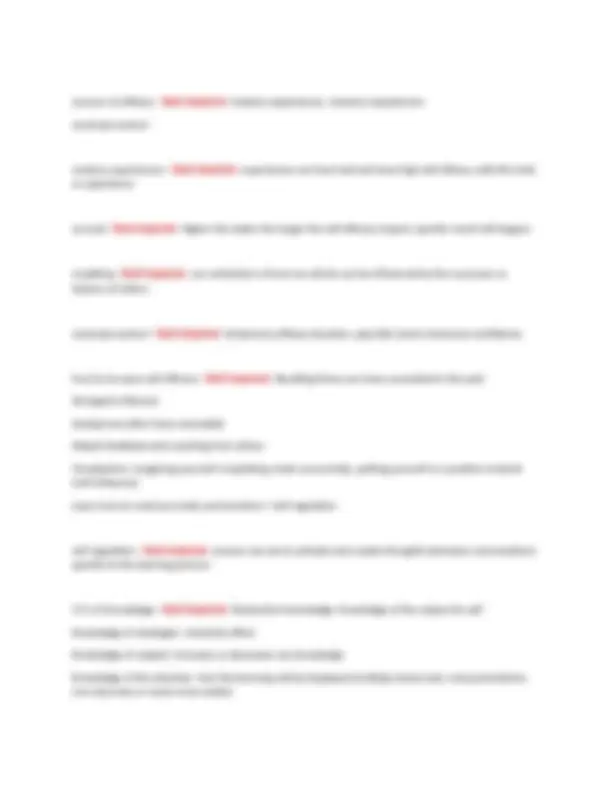
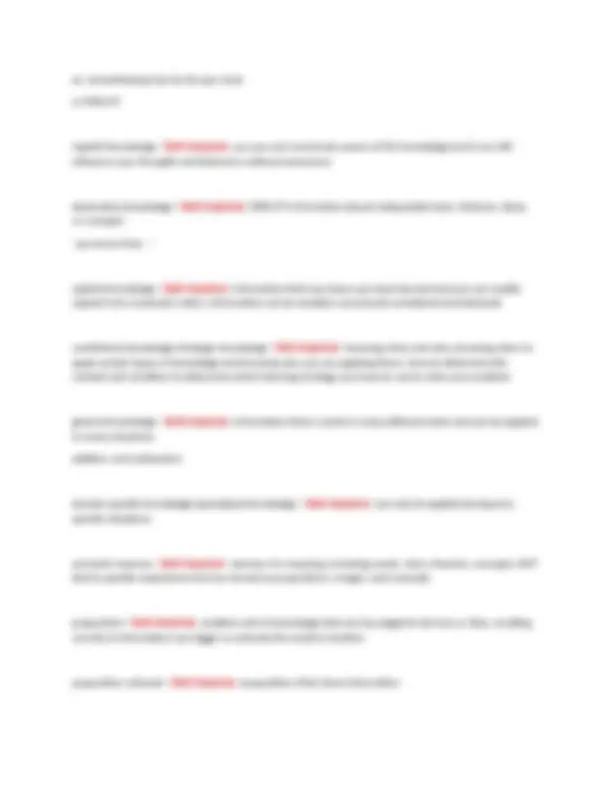
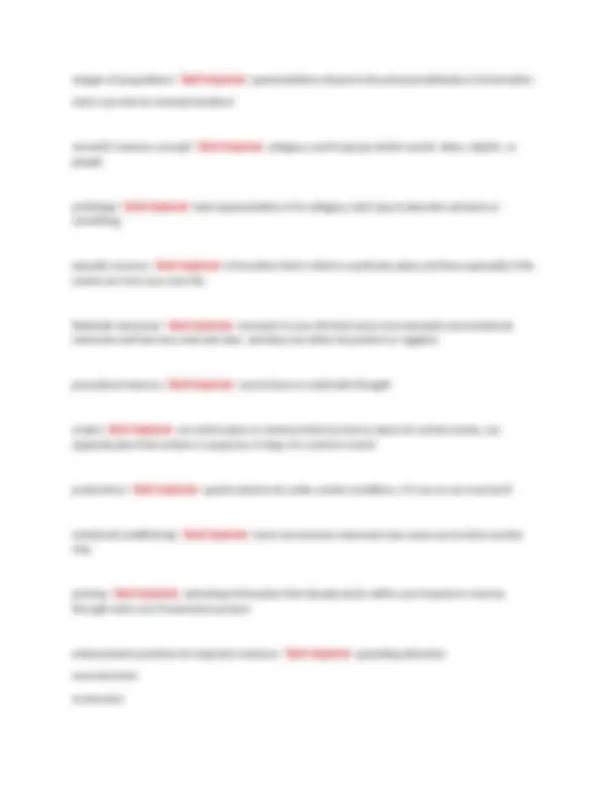
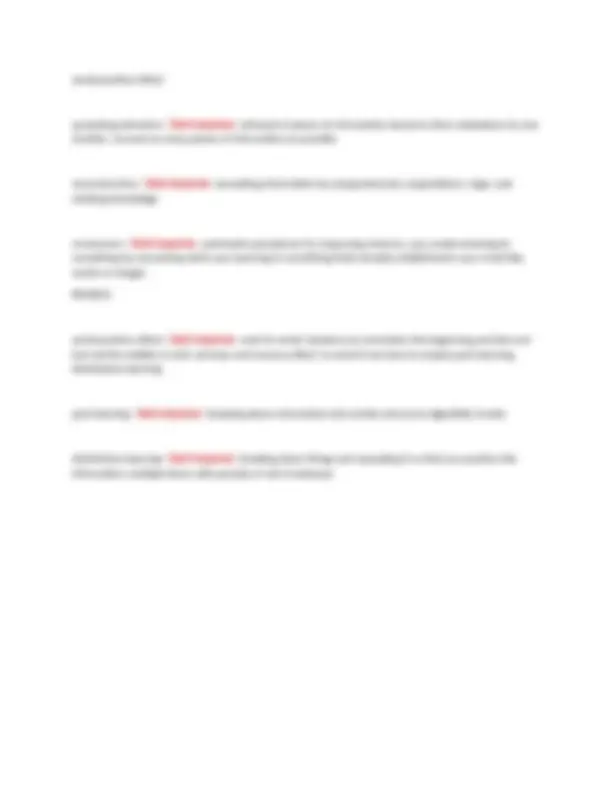


Study with the several resources on Docsity

Earn points by helping other students or get them with a premium plan


Prepare for your exams
Study with the several resources on Docsity

Earn points to download
Earn points by helping other students or get them with a premium plan
Community
Ask the community for help and clear up your study doubts
Discover the best universities in your country according to Docsity users
Free resources
Download our free guides on studying techniques, anxiety management strategies, and thesis advice from Docsity tutors
A comprehensive overview of learning theories and principles, focusing on behavioral and cognitive perspectives. It explores key concepts such as classical and operant conditioning, reinforcement, and memory processes. Definitions, examples, and explanations of various learning theories and their applications.
Typology: Exams
1 / 15

This page cannot be seen from the preview
Don't miss anything!










Definition of learning - best response acquisition of knowledge or skills through experience and internalization, permanent change result of learning - best response change in knowledge or behavior Endurance - best response a long period of time learning Experience vs maturation - best response older but not necessarily wiser, just because we grow older doesn't mean we have learned anything, we can chronologically and biologically age Change must be brought about with - best response experience, and must be in place for a long period of time in order to truly learn it Internalization - best response can use after learning has occurred, is long-lasting and a part of your knowledge base, and shows what you know. associative learning - best response a framework for behavioral learning, that identifies how living organisms perceive contingency relations between events or stimuli in their environment. Adaptive behavior because we can anticipate the occurrence and then reaction. We can mentally link ideas and experiences to each other Group things together Placement: Proximity: Principle of contiguity Principle of contiguity - best response when they occur, timing, not where they occur, things that occur close together become linked together, when two events occur together often enough they will become associated (Repeated pairings), stimulus-response Behaviorism - best response change in action, observable behavior changes based on associative learning
Classical conditioning (Pavlov) - best response focuses on the learning of involuntary physiological responses, the response never changes, nothing new is learned, no new behavior Stimulus - best response the event that occurs in the environment itself, an event that activates a behavior Unconditioned stimulus - best response no learning is necessary for a response to occur, response that is uncontrollable, hardwired (FOOD) Conditioned stimulus - best response evokes a response after learning, neutral before paired with another stimulus (BELL RING) Response - best response observable reaction to a stimulus Unconditioned response - best response salivating Conditioned response - best response salivating Operant conditioning (skinner) - best response explains how through operating on our environment new behaviors might be acquired, deliberate actions, acquire and learn new behaviors, active learning in which voluntary behavior is strengthened or weakened based on the presence of antecedents or consequences. Operant - best response Humans are operants not respondents antecedent - best response occurs before the behavior, event or stimulus that precedes an action anything that occurs before, sets up the behavior that should follow, stimulus controlled, demonstrates an individual will perform the behavior in the presence of a stimulus, stimulus can trigger or suppress a future behavior, some will activate a behavior
ratio - best response number of behaviors, every 5th behavior provide a reinforcement, how many times they occur Variable - best response BEST WAY, unpredicatble, doesnt follow a set schedule or interval extinction - best response (what happens to the behavior after the consequence is taken away) resistance of behavior dying off Cues - best response something in the environment relates to the skill that naturally reminds the person to do the behavior, naturally related to the skill, trigger, more subtle Prompts - best response has to be integrated, gesture, not naturally related to the behavior (clap back with teacher) (howdy!) extra support added in the form of hints or reminders Encouraging behavior - best response premack, shaping, positive practice Premack behavior - best response more desirable behavior can be used to reinforce something they dont want to do Shaping - best response successive approximations (close enough but still reinforce) reinforcing incremental gains instead of the whole thing Positive practice - best response when you miss a word in a spelling test you have to rewrite the word 5 times Discouraging behavior - best response timeout, response cost timeout - best response removal of someone from an environment, principals office response cost - best response weigh what you will gain vs what you would lose
Locus and focus of learning - best response where learning is located and what is being learned? What is learned in behavioral views of learning? - best response new behaviors themselves what is the location of behavior learning - best response external, stimuli in the environment what is the role of reinforcement in behavioral learning - best response Critical, reinforce positively or negatively, necessary, without it you can not determine the relationship between behavior and stimuli Locus and focus of cognitive view of learning - best response internal, view learning as an active internal mental process, harder to quantify What is learned in cognitive view - best response New information, data, knowledge, facts what is the role of reinforcement in cognitive view - best response Source of information that is not critical to the learning process Principles of organization in cognitive learning theories - best response encoding storage retrieval structures of cognitive learning theories - best response sensory memory working memory long term memory encoding - best response first, gather information and organize it, the process of input, central memory is where it occurs storage - best response retaining information, what we are doing with the information in the present, how and where we hold new information
Contains active temporary processing, an interface where new information is combined with existing knowledge, connected to old information Components of working memory - best response phonological loop, visual-spatial sketchpad, central executive epidosic buffer phonological loop - best response hold verbal, and acoustical, sounds we heard and repeat Visual-spatial sketchpad - best response visual information, spacial orientation Central executive - best response governs the entire process episodic buffer - best response contains both phonological and visual, both words and pictures maintenance rehearsal - best response actively using it, unless you do something with the information you will forget, repeating Elaboration rehearsal - best response making connections to something we know and finding a way to integrate it into knowledge capacity of working memory - best response 5-9 digits of information, digits: separate, unconnected pieces of the stimuli chunking - best response combining things into meaningful wholes cognitive load - best response volume of mental resources needed to complete a task types of strain on your brain - best response intrinsic extraneous
germane intrinsic - best response cognitive resources that are inherent to the task itself, listening to lecture and taking notes, what you are focusing on extraneous - best response mental effort or cognitive resources required to process stimuli irrelevant to the task. Distractions, music while doing homework and you have to get rid of it germane - best response true deep learning, goes beyond the task and is the deepest processing of the material and you connect it to something else, concentrated effort not just concentration, information that will make it to long-term memory and will be enduring true comprehension Social Learning Theory - best response you can learn through the actions of others Definition of social learning theory - best response emphasizes learning through observation of others, differentiates learning (acquisition of knowledge) and behavior (observable performance based on knowledge learned) distinguishing features of social learning theory - best response theories are limited because they do not take into account the influence of context and setting, role of context and setting in social learning theory - best response context and setting will influence what we choose to demonstrate, "you might know it but you might not want to show it" not wanting to raise your hand even though you know the answer, methods of learning - best response inactive, vicarious inactive learning - best response learning from your own experience and actions vicarious learning - best response learning from the experience of others (watch and observe) elements of observational learning - best response attention, retention, production, motivation
sources of efficacy - best response mastery experiences, vicarious experiences social persuasion mastery experiences - best response experiences we have had and have high self efficacy with this task or experience arousal - best response Higher the stakes the larger the self efficacy impact, specific result will happen modeling - best response our estimation of how we will do can be influenced by the successes or failures of others social persuasion - best response temporary efficacy boosters, pep talk, boost someones confidence how to increase self efficacy - best response Recalling times you have succeeded in the past Strongest influence Seeing how other have succeeded Helpful feedback and coaching from others Visualization, imagining yourself completing a task successfully, putting yourself in a positive mindset (self influence) Learn how to read your body and emotions *self regulation self regulation - best response process we use to activate and sustain thoughts behaviors and emotions specific to the learning process 4 S's of knowledge - best response Declarative knowledge: knowledge of the subject its self Knowledge of strategies: maximize effort Knowledge of subject: Increases or decreases our knowledge Knowledge of the situation: how the learning will be displayed (multiple choice test, oral presentation, one may ease or cause more axiety)
metacognition - best response thinking about thinking, FOUR s's together, how you monitor your own thinking process motivation - best response volition and value volition - best response will power, shut off influences that inhibit learning process (distractions) skill power and will power, sustain learning process from beginning to end value - best response purpose, gain, benefit, ex. Aggie ring, ergonomic factors - best response environments, intentional structures of learning environments that increase comfort and efficiency senses settings environment as the - best response third teacher, space is as central to learning as teachers are engagement factors - best response feel connected and committed relationships social constructivism - best response learning through the knowledge of others that know more, expert (teacher) types of social constructivism - best response psychological and social first wave of social constructivism - best response inactive learning, psychological in nature I.M.M-First wave of social constructivism - best response individually, meaning, making (meaningful and makes sense to you, uniquely learned the material)
ex. remembering how to tie your shoe is IMPLICIT implicit knowledge - best response you are not consciously aware of this knowledge but it can still influence your thoughts and behaviors without awareness declarative knowledge - best response EXPLICIT information about indisputable facts, histories, ideas, or concepts "you know that..." explicit knowledge - best response information that you know you have learned and you can readily repeat it at a moments notice, information can be recalled, consciously considered and declared conditional knowledge/strategic knowledge - best response knowing when and why, knowing when to apply certain types of knowledge and knowing why you are applying them, have to determine the context and condition to determine which learning strategy you have to use to solve your problem general knowledge - best response information that is useful in many different tasks and can be applied to many situations addition and subtraction domain specific knowledge/specialized knowledge - best response can only be applied during very specific situations semantic memory - best response memory for meaning, including words, facts, theories, concepts, NOT tied to specific experiences but are stored as propositions, images, and concepts proposition - best response smallest unit of knowledge that can be judged to be true or false, recalling one bit of information can trigger or activate the recall of another proposition network - best response propositions that share information
images of propositions - best response representations based on the physical attributes of information mind, eye view to recreate locations semantic memory concept - best response category used to group similar events, ideas, objects, or people prototype - best response best representative of its category, best way to describe someone or something, episodic memory - best response information that is tied to a particular place and time especially if the events are from your own life flashbulb memories - best response moments in your life that were more dramatic and emotional, memories will feel very vivid and clear, and they can either be positive or negative procedural memory - best response unconscious or automatic thought scripts - best response are action plans or schemas that we have in place for certain events, our expected plan that contains a sequence of steps for common events productions - best response specify what to do under certain conditions, if A occurs we must do B emotional conditioning - best response some unconscious memories may cause you to feel a certain way, priming - best response activating information that already exists within your long term memory through some out of awareness process enhancement practices for long term memory - best response spreading activation reconstruction mnemonics